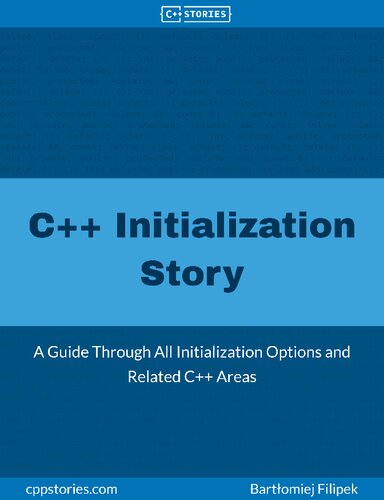

Most ebook files are in PDF format, so you can easily read them using various software such as Foxit Reader or directly on the Google Chrome browser.
Some ebook files are released by publishers in other formats such as .awz, .mobi, .epub, .fb2, etc. You may need to install specific software to read these formats on mobile/PC, such as Calibre.
Please read the tutorial at this link: https://ebookbell.com/faq
We offer FREE conversion to the popular formats you request; however, this may take some time. Therefore, right after payment, please email us, and we will try to provide the service as quickly as possible.
For some exceptional file formats or broken links (if any), please refrain from opening any disputes. Instead, email us first, and we will try to assist within a maximum of 6 hours.
EbookBell Team

5.0
20 reviewsFrom basic syntax, constructor and destruction rules, lifetime, and template deduction. Everything you want to know about Modern C++ techniques related to initialization. C++20 included!
Initialization in C++ is a hot topic! The internet is full of discussions about best practices, and there are even funny memes on that subject. The situation is not surprising, as there are more than a dozen ways to initialize a simple integer value, complex rules for the auto-type deduction, data members, and object lifetime nuances.
And here comes the book.
Throughout this text, you will learn practical options to initialize various categories of variables and data members in Modern C++. More specifically, this text teaches multiple types of initialization, constructors, non-static data member initialization, inline variables, designated initializers, and more. Additionally, you’ll see the changes and new techniques from C++11 to C++20 and lots of examples to round out your understanding.
Learn C++ from the perspective of C++ Initialization!
The plan is to explain most (if not all) parts of initialization, learn lots of excellent C++ techniques, and see what happens under the hood.
The goal of this book is to equip you with the following knowledge
Explain rules about object initialization, including regular variables, data members, and non-local objects.
How to implement special member functions (constructors, destructors, copy/move operations) and when they are helpful.
How to efficiently initialize non-static data members using C++11 features like non-static data member initialization, inheriting, and delegating constructors.
How to streamline working with static variables and static data members with inline variables from C++17.
How to work with container-like members, non-copyable data members (like `const` data members) or move-able only data members, or even lambdas.
What is an aggregate, and how to create such objects with designated initializers from C++20.
The book contains 14